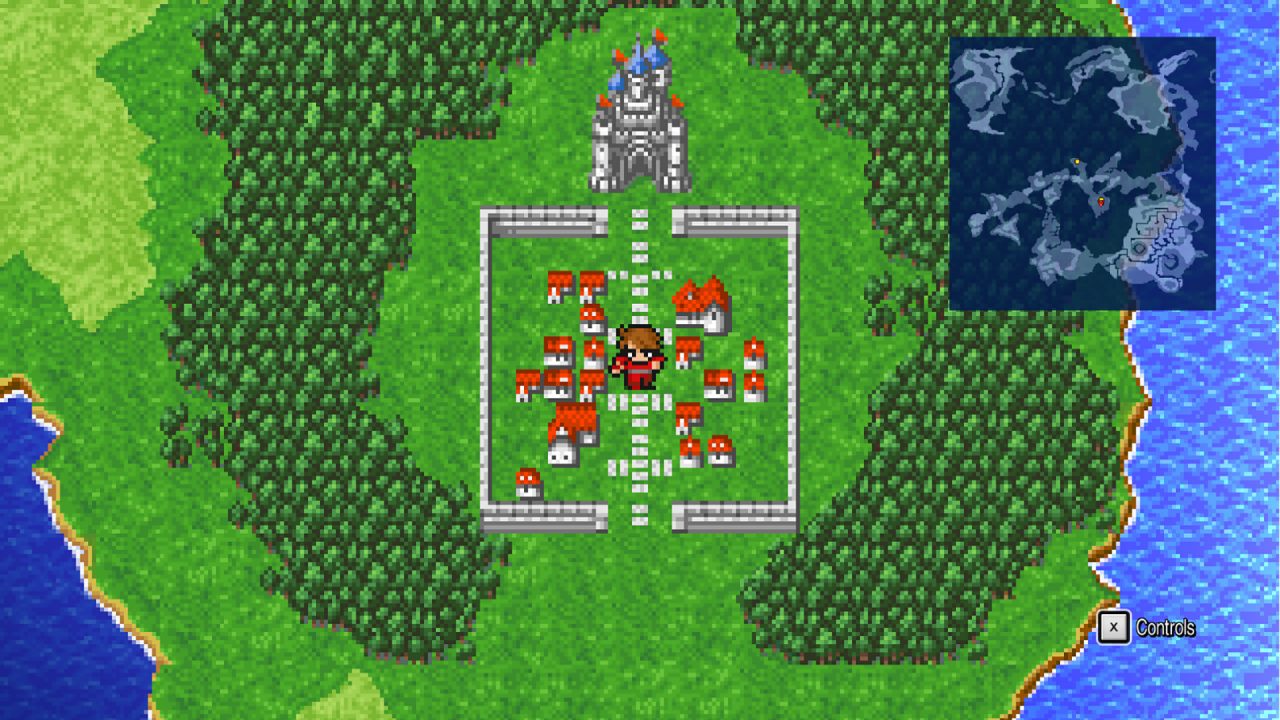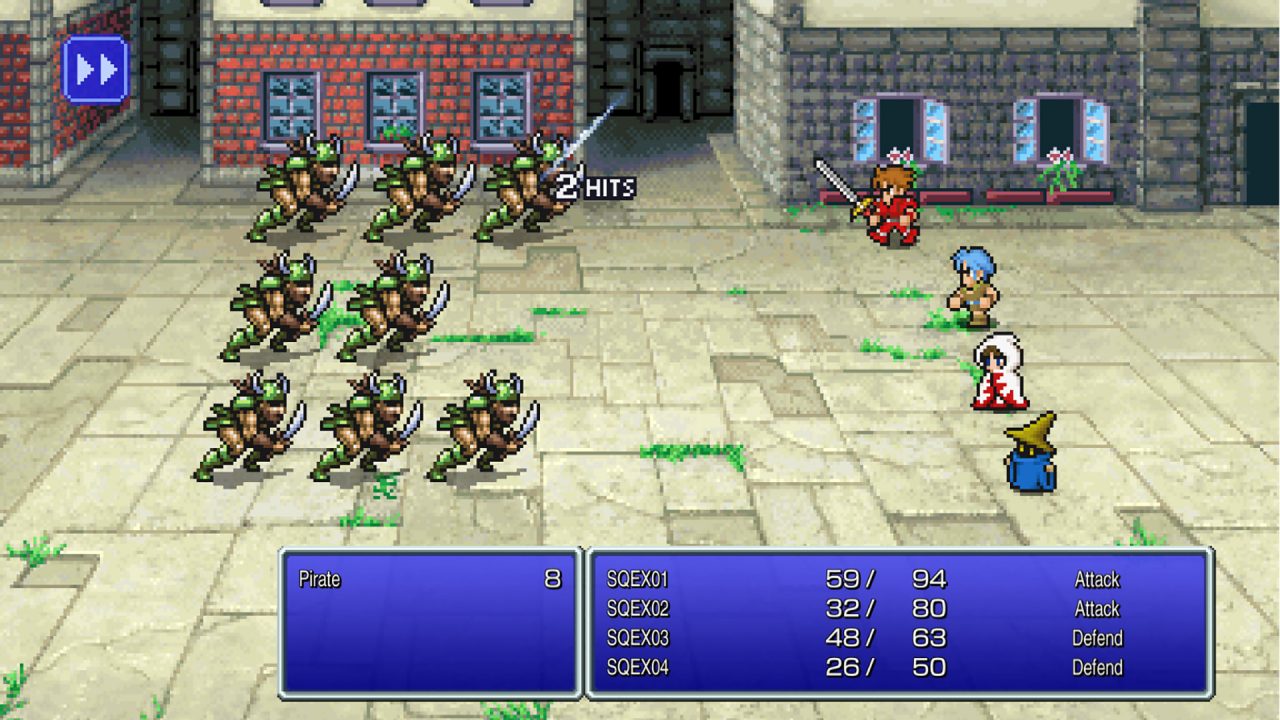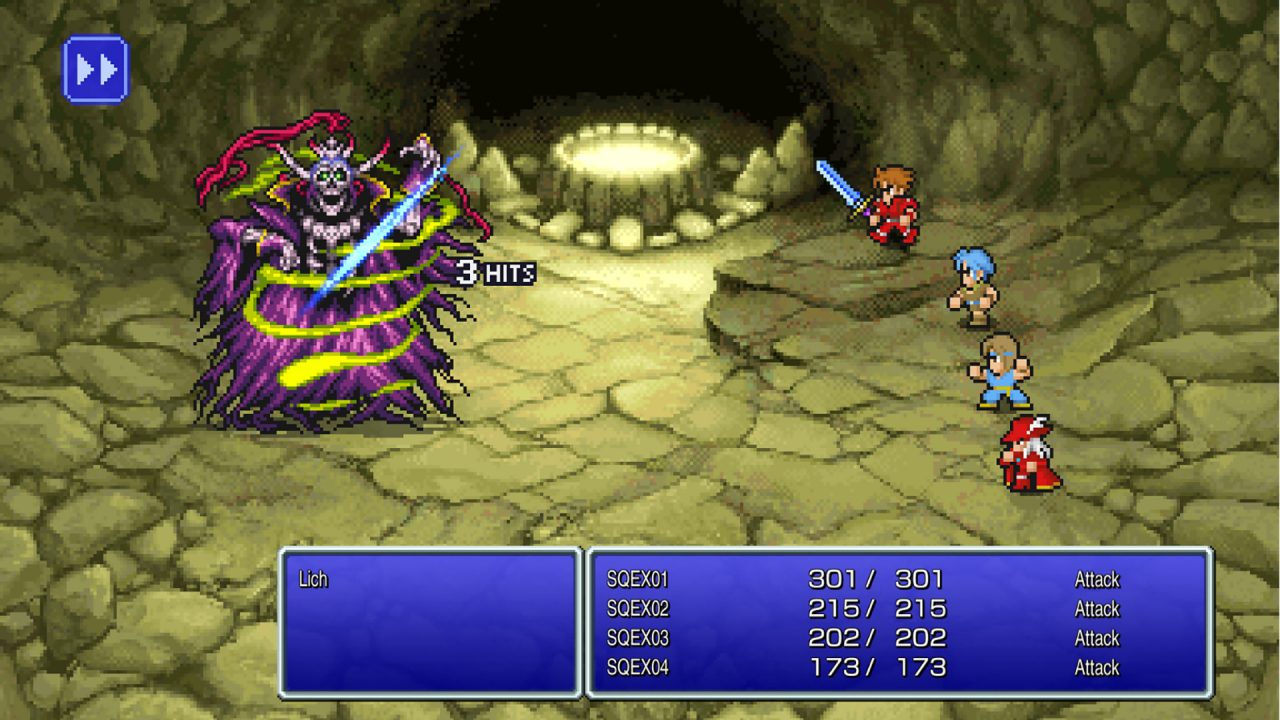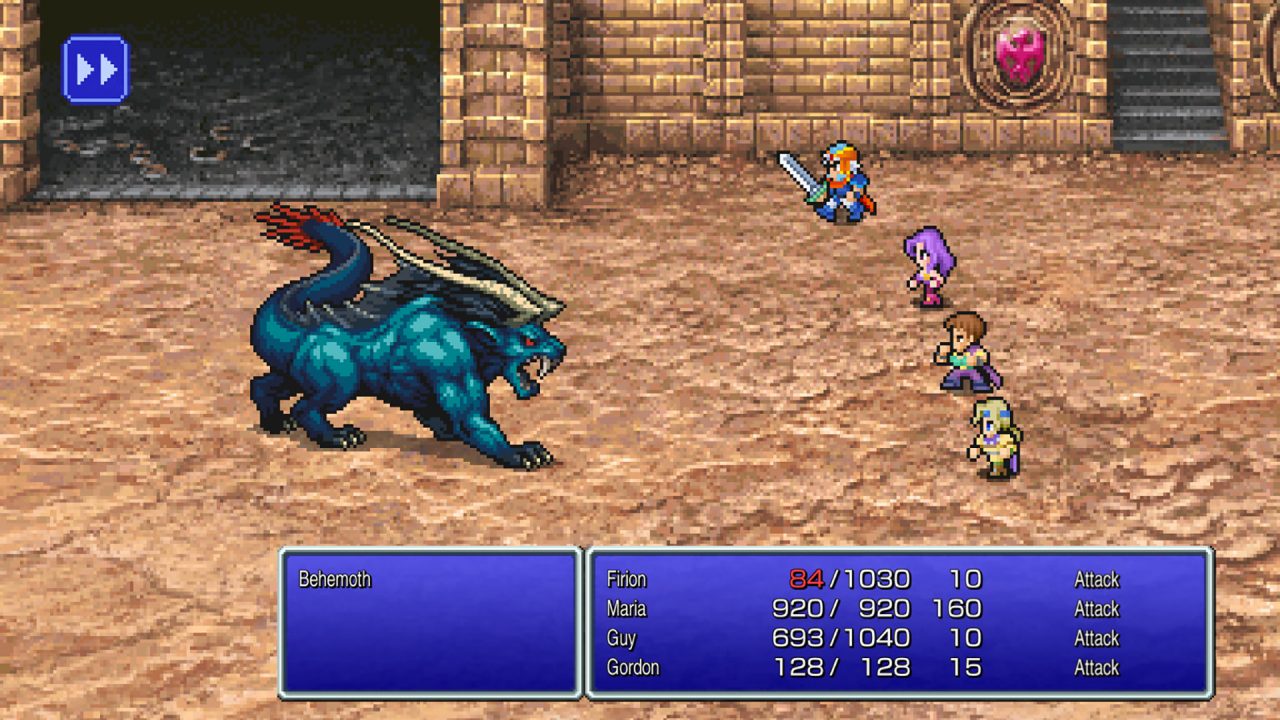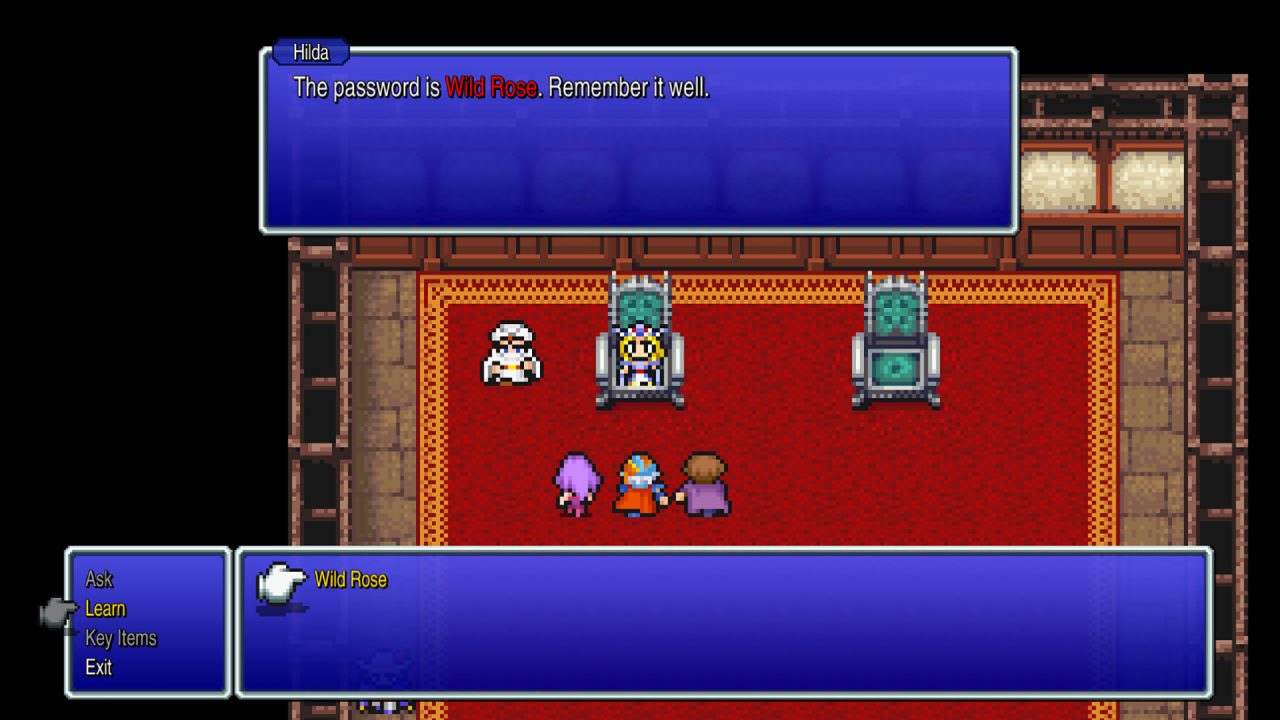I may likely qualify as a Final Fantasy fanboy. The first console games I played are from the series, and I’d list a couple as my favourite games of all time. I must admit, somewhat controversially, that I haven’t ever completed (or in some cases played at all) Final Fantasy I through VI. I know it’s bad — I hang my head in shame. Without making excuses for myself, it’s a combination of me not getting a console until the PlayStation and many of these games not releasing in Europe until the 2000s, so playing them has always felt like something I’d do eventually but wasn’t urgent due to their age. With the release of the Pixel Remasters, I decided that now is the time for me to fully experience these landmark games.
I obviously know them by reputation and have even played some partially (mainly VI and a little of IV and V). I’m very conscious of how experimental they were for their time and keen to see the roots of gameplay elements that have become standard in the series and broader genre. When I consider the 8- and 16-bit era games, what stands out is how each entry tries something different or makes refinements based on what worked and what was less successful in previous games. Each game is a new draft of a similar idea, successively getting closer to perfection and with more nuance than the grand sweeping changes we see between more modern Final Fantasy entries where even genre is up for grabs. My aim is to write about my experience with each game as I complete it. FFI is strictly discussion, but as I play through and complete II-VI, I’ll start comparing and contrasting them. Disclaimer: there will be spoilers. Maybe I will even rank them as I go. I do love a ranking. With all my expectations in mind, I’m excited to experience the six stories and many new characters I have before me.
“For you are the warrior who crossed time. You are the bringer of light.”
Final Fantasy. I went in with little existing knowledge — I knew the story was relatively light (literally) and brief, but that’s all. When unexpectedly faced with a character name entry screen on beginning the game, my instinct was to name them canonically, as I tend to do in these instances. After a quick Google search, I was disappointed to find that the Warriors of Light in FFI don’t exactly have canon names. This was a turn-off before even starting the game proper. If the characters lack official names, I expected their personalities and interactions with each other and other key characters to be minimal. Not off to a great start! Now that I’ve completed the game, I can see that my initial instinct was accurate; the blank slate main characters with zero personality are one of my main negative takeaways from this game. As I write this, having only completed the first of the six games, I’m anticipating FFI is an outlier with respect to the main cast. I really hope I’m right.
The vague plot also left an impression on me once I began the game in earnest. I often did not know where I was going, what I was looking for, or why. I don’t see this necessarily as a negative. It encouraged exploration but also constant consideration of the game world — where had I been that might help me? Is there an area I’ve not fully explored? Did I encounter a character earlier who seemed like they had more to reveal? It was not unusual for me to reach a town, talk to the NPCs, and subsequently remain in the dark as to my next steps, but I appreciated the opportunity to figure things out for myself, explore (on foot or one of the myriad vehicles), and go with the flow of the game. Loose, ambiguous stories can certainly work well when done properly, and I’m not averse to putting in work to piece lore together. I found this refreshing compared to the hand-holding we see in many modern games. It just takes some getting used to.
I found Final Fantasy’s systems refreshing in their simplicity, in contrast to the sometimes overcomplex ones we see nowadays. MP functions in a way analogous to the Suikoden series, where magic has levels, each spell falls under a particular level, and these levels have a limited number of casts. This felt familiar, and I appreciated the agency you have over which spells mages learn, often requiring the sacrifice of one spell per level due to limited slots. Physical classes don’t get any abilities to worry about: just attack, defend, and item commands (and possibly a couple of low-level spells later on). At least, this was the case with my party of Fighter, Black Belt, Black Mage, and White Mage. Standard, but it does what you need it to and means you’re not bogged down in ability/stat minutiae. Everything about this game feels pacey, there’s nothing that outstays its welcome, and party management is minimal, allowing you to keep on moving to the next plot beat. Well, besides the horrible random encounter rate. At least the Pixel Remaster lets you turn those off — that’s a big tick from me! I do wonder if the encounter rate was this bad in the original version of this game because that requires some serious patience on behalf of the player.
Speaking of which, the purists out there may chide me for using some of the boosts the Pixel Remaster series includes: no encounters, exp and gil boosts, and auto-battle. But in my eyes, the developers knew these games wouldn’t be received as well by modern audiences without them. So, while not constantly abusing them, I made use of them all to help reduce grinding time and make that egregious encounter rate easier to deal with.
The music is, unsurprisingly, an absolute highlight. Final Fantasy music is always top-tier, and the beautifully arranged tracks by Nobuo Uematsu on the Pixel Remaster are exactly that. Overall, the OST gives quite traditional vintage fantasy vibes, at odds with the later Final Fantasy games I’m more familiar with, FFIX being the exception. This soundtrack features pipes, plucky strings, and even guest appearances from an accordion and what sounds like a harpsichord. It’s generally a relaxing listen with bursts of energy interjected by battle themes, the final boss theme being one of the best. Standout tracks for me include the Chaos Shrine theme, full of mysticism, beautiful twinkling sound effects, and gliding strings; and The Lute. Though short, this folky rendition of the Final Fantasy theme sounded quite different to the rest of the soundtrack and was a refreshing change of pace. It’s just a shame it didn’t last longer!
A final few observations before I talk about the endgame. I found it charming and quite funny how this game crams in the fantasy references — there are mermaids, robots, witches, and all manner of fantastical people and creatures. It did feel a little messy in places, with the world slightly lacking its own identity by including all of these slightly cliché and overused fantasy elements. I had to remind myself that this was made in the 80’s.
I experienced bursts of internal glee when spotting references used by later games in the series. Final Fantasy IX comes to mind for its number of callbacks to this game: using FFI’s Shrine Guardians as bosses in the late game, an antagonist called Garland, and an area called Mount Gulug, a very direct reference to Mount Gulg in FFI that even uses the same music (a highlight of both FFI and FFIX’s OSTs, I might add). I also need to give special mention to the airship: I felt joy and confusion in equal measure with how it literally comes out of nowhere. No buildup to acquiring it, no mention of it ever before (as far as I encountered anyway), yet it pops up out of the desert and belongs to you. Sentient ships, maybe?
The endgame, specifically the final boss, of Final Fantasy seemed uneven. There’s definitely something odd here in terms of leveling and difficulty — at least with this version. I breezed through the Temple of Chaos with my high-level party, running down the bosses with surprising ease. Each Shrine Guardian Mk.II melted like butter in the face of my undeniable power. When I reached Chaos himself, I felt confident, even cocky. Boy, was that a mistake! Off to a strong start, my team (Knight, Master, White and Black Wizards) did decent damage, or so I thought, but I also took it in kind. Then Chaos used Curaja and fully healed himself while I watched agape. “Okay, I guess I have to keep going and try to really pile on the damage,” I thought to myself and proceeded to do so, only for him to use it again a few minutes later and then utterly destroy my party with his ridiculously damaging physical attack.
Something did not feel right here. How could I suddenly feel outmatched and to such a degree, after the ease of getting to Chaos in the first place? I decided to research whether others had had the same experience. I discovered that in the Pixel Remaster (and maybe another earlier version of the game), the level cap had been increased to 99 from 50 and Chaos’ difficulty adjusted somewhat to work with that new level cap increase. Needless to say, after hitting the grind to reach level 65, Chaos didn’t stand a chance.
When watching the conclusion of the game, after stopping the time loop dramatically revealed at the end of the game (your characters have been fighting Chaos/Garland over and over again and losing each time), I had an epiphany. I had been playing the final time loop, the final repetition of that story, the final fantasy. Nice.
‘Unbelievable…defeated by insects like you…not once, but twice.’
Final Fantasy II! I got straight into this after finishing FFI, and wow, I’ve heard so much negativity about this entry. Out of the six Pixel Remasters, this is the one I’m going into with the most preconceptions, entirely focused on the experience and leveling system, which is apparently terrible. Besides that, I knew Square had filled out the characters (they have names!) and story more, but little else. Now that I’ve completed the game (just a few hours ago as I write this), I can say that Final Fantasy II has left a strong positive impression on me, I absolutely prefer it over Final Fantasy I, and I feel the hate it gets is not deserved. However, I do still have some gripes with it. Let’s discuss!
Let’s start with the leveling system, since this is the most unusual aspect of this entry and what causes the most controversy among fans. I agree that it takes some time to get accustomed to, but I didn’t hate it. It’s also worth noting that there have been other games since that’ve used a similar system — skills/stats you use gain experience and level up, those you don’t use don’t level up. One of the biggest-name modern games using a similar method is Elder Scrolls V: Skyrim.
However, this character growth system isn’t without irritations. First, I wasn’t battling naturally because I’d be obsessing over what needed to level up. I spent a substantial amount of time casting status magic, buffing my team during random battles, and attacking my own party members to increase spell levels, HP, and stats. Secondly, I found it hard to gauge my strength relative to story progression without any traditional level system. Ordinarily, I know that my stats are where they should be if I can see I’m at a particular level, and I can go confidently into a boss battle. In FFII, there’s no real way of knowing if any stats are lacking and how high or low they are compared to what you’re currently fighting. I’m quite a cautious player, so this led to me being slightly over-leveled during most of my playthrough.
On the positive side, I enjoyed the freedom to build my characters however I wanted. Characters can all use any weapon and magic, and that the fact that you decide exactly which spells you’d like your team to learn is great. Nevertheless, I swiftly realised that building a jack-of-all-trades character would lead to them being weak without serious grinding. In the end, I rocked Firion, master of many weapons and a small curated selection of signature black and white magic; Maria, black magic nuker extraordinaire and full-time back row rod user; Guy, axe and rod powerhouse who also happens to be a pro at white magic, alongside a guest character who generally retained whatever kit they came with.
The characters themselves are a mixed bag for me. I welcomed the distinctness of each. Finally, they have some personality, emphasis on some, and there are interpersonal dynamics between the core team that actually develop with story progression. My favourites were actually temporary party members rather than the core cast of three. Sure, Firion, Maria, and Guy were fine, but Ricard and Minwu were my main guys: Minwu can cast giant laser beams and is a general magic-wielding badass, and Ricard is the last Dragoon who got trapped inside Leviathan (which is…a whale?) while searching for Ultima. I particularly loved Ricard’s sprite work because he felt much more individual than any of the other cast members.
I was pleased to see a more evolved story in this entry compared to the bare-bones plot of FFI. It is still basic by modern standards, but what’s there is good. Beginning the game with a base town surrounded by empire forces and occupied cities feels oppressive. I wondered how the story would develop in a way allowing the empire to inevitably be overthrown. Sneaking my team in and out of towns to gain new allies and tools, then returning to the base felt very cool. Various plot twists through the game swing the war to and from your favour, giving a depth and mystery which is certainly lacking in the previous game. While having a fuller story, FFII did retain some of the freedom of FFI and still relies on exploration, engaging with NPCs, and paying attention to the world around you to progress.
As you might expect from a story of this nature, many vital characters die in FFII. Almost all of the guest party members meet a valiant end assisting in the fight against the empire. I don’t think this volume of main and named side characters have been killed off in any other Final Fantasy I’ve played. I liked this rather cruel, sadistic element. Getting attached to my guest characters (particularly the ones I mentioned earlier) and seeing them meet their demise so frequently was quite brutal! It kept me guessing about the fate of my characters in a similar way to watching/reading Game of Thrones. I respect a game that doesn’t pull any punches, so well done for that, Final Fantasy II, though I found the impact lessened slightly due to the graphical style.
Moving into the endgame, I finally got Leon in my party. He’s fine, but he’d been mentioned so many times from the start, it was inevitable he’d join up eventually. (I would have rather kept Ricard.) I found the last couple of hours of FFII a more standard affair than its predecessor. Pandaemonium is a long dungeon, seemingly inside a crystal in space — everything looks so sparkly, and outside the walls are stars. I’m sure I went underground? Who knows, but it looks pretty. A little while earlier, I’d claimed the Blood Sword from a helpful guy called Paul who apparently has a penchant for stashing beneficial items. I did not realise at the time how it worked, just that it was powerful. So powerful that it made absolute mincemeat of the Emperor and I beat him down in about four rounds. After completing the game, I read up on the sword and discovered how much of a cheesefest it makes the final boss. I mean, if it’s in the game, I’ll use it!
I couldn’t praise the music enough in FFI; it was unsurprisingly fantastic and the new arranged music in the entire Pixel Remaster series is a big factor in why I want to experience these particular versions. Unfortunately, the FFII soundtrack doesn’t hit in the same way for me. It’s certainly not bad by any means; I just found it less memorable, and no tracks reached the same highs as some of my favourites from the previous game.
So, to wrap up my feelings on the first two Final Fantasy Pixel Remasters: Personally, I found Final Fantasy II the better game and by quite a margin. My time in its world felt like an enjoyable, high-stakes adventure with its story of rebellion and justice. It strikes a strong balance between more involved story and freedom of exploration. I’m also aware that the version of FFII I’ve played is likely vastly improved over the original in terms of its leveling system specifically. I’m pleased there’s finally a version of this particular entry that will hopefully elicit a more positive fan response going forward. FFI wins hands-down in the music department, though. I also firmly believe that the world is ready for a canoe revival in Final Fantasy XVII! Now, on to Final Fantasy III.

